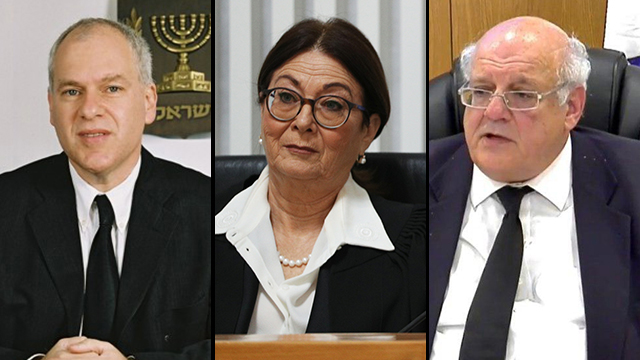The High Court debates Netanyahu’s competence to form a government
Supreme Court discusses a petition of 67 intellectuals and high-tech demanding ruling on whether Knesset member battling criminal charges can be tasked with putting together a coalition. Netanyahu supporters protest outside the court
The High Court of Justice on Tuesday debates a petition seeking to determine whether Benjamin Netanyahu could impose the mandate for the next government. Participating in the hearing are President of the Supreme Court Esther Hayut, Deputy Chief Justice Hanan Melcer and Justice Uzi Fogelman,
Outside the court demonstrates several dozen Netanyahu supporters, waving signs and making music in an amplification system.
In a petition filed by 67 intellectuals and high-tech people, they demanded that the government train not be imposed on a Knesset member who was indicted for misdemeanor offenses. Attorney General Avihai Mandelblit asked the High Court to discuss only the limited question of whether the issue merits a debate at all in this timing and not decide on the principle. In the meantime, the prime minister repeats the message that “only the people decide who will lead”.
The petition by intellectuals and high-tech people, including writer Joshua Sobol and entrepreneur Dov Moran, was filed immediately after the attorney general announced his decision a month ago to prosecute Netanyahu for serious corruption crimes involving a libel case. Netanyahu is charged with three counts of bribery, fraud, and breach of trust.
Petitioners’ demand for a declaratory order from the High Court required a hearing to be held in a senior assembly, but it is highly doubtful whether the High Court will decide on this principle. The fact that President Hayut ruled that only three judges will discuss the petition drew criticism on the right because of political sensitivity.
If the judges decide to discuss the matter in principle, presumably living will expand the composition of the judges to at least nine because it is a matter of far-reaching political implications and of public trust implications. In such a case, the lineup is expected to include activist judges alongside conservatives who will decide the issue.
Netanyahu continues to post anti-High Court interventions on the issue. In a video released on the eve of the High Court hearing, he claimed that “there are those who are trying to drag the Supreme Court into the political field so that it will legally deny my candidacy. I do not think that the Supreme Court Of the State of Israel will fall into this trap. In a democracy who decides who will lead the people is only the people and not anyone else. That has always been and always will be. ”
Netanyahu’s supporters, including renowned jurists, argue that the prime minister’s legal status is radically different from that of a minister or a mayor and that the basic law of the government is not the exception.
First, it is a prime minister who, if forced to resign, the government falls. Second, as opposed to a minister or deputy minister, the Basic Law states that the prime minister can hold office until a final judgment in his case is reached, ie a judgment that also exhausted the appeal proceedings.
They will also argue that the right to choose and be elected is a supreme constitutional right in Israeli law, and special reasons need to be taken to prevent a person from being elected to the Knesset. Some will also argue that the issue is unjust and that the public should be allowed to decide.




